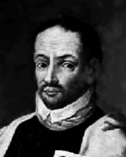music.wikisort.org - Composer
Alonso Lobo (February 25, 1555 (baptised) – April 5, 1617) was a Spanish composer of the late Renaissance. Although not as famous as Tomás Luis de Victoria, he was highly regarded at the time, and Victoria himself considered him to be his equal.

Biography

Lobo was born in Osuna, and after being a choirboy at the cathedral in Seville, he received a degree at the University of Osuna, and took a position as a canon at a church in Osuna sometime before 1591. In that year, the Seville Cathedral appointed him as assistant to Francisco Guerrero, and he later became maestro de capilla during Guerrero's leave of absence. In 1593, Toledo Cathedral hired him as maestro de capilla; he remained there until 1604, when he returned to Seville, where he died.
Lobo's music combines the smooth contrapuntal technique of Palestrina with the sombre intensity of Victoria. Some of his music also uses polychoral techniques, which were common in Italy around 1600, though Lobo never used more than two choirs (contemporary choral music of the Venetian school often used many more — the Gabrielis often wrote for as many choirs as there were choir-lofts at St Mark's Basilica). Lobo was influential far beyond the borders of his native Spain: in Portugal, and as far away as Mexico, for the next hundred years or more he was considered to be one of the finest Spanish composers.
His works include masses and motets, three Passion settings, Lamentations, psalms and hymns, as well as a Miserere for 12 voices (which has since become lost). His best-known work, Versa est in luctum, was written on the death of Philip II in 1598. No secular or instrumental music by Lobo is known to survive today.
Publications
- 1602, Madrid, Liber primus missarum
References
- Owen Rees: "Lobo, Alonso" in The Oxford Companion to Music, ed. Alison Latham. Oxford University Press, 2003. ISBN 0-19-866212-2
- Gustave Reese, Music in the Renaissance. New York, W.W. Norton & Co., 1954. ISBN 0-393-09530-4
- Article "Alonso Lobo" in The New Grove Dictionary of Music and Musicians, ed. Stanley Sadie. 20 vol. London, Macmillan Publishers Ltd., 1980. ISBN 1-56159-174-2
Recordings
- Lamentations, Choir of Westminster Cathedral directed by Martin Baker on Hyperion CDA68106
- Missa Simile est regnum caelorum, Missa O rex gloriae and Lamentations, Choir of King's College London directed by David Trendell on Sanctuary Gaudeamus, 2002
- Vivo ego, dicit Dominus recorded by Musicaficta Ensemble, directed by Andrea Angelini
- Versa est in luctum & Lamentationes Ieremiae Prophetae, on the disc Santiago a Cappella, The Monteverdi Choir, directed by John Eliot Gardiner on Universal Classics
- Versa est in luctum & Lamentations & Libera Me, on the disc The Golden Age, Siglo de oro, released 2008 by The King's Singers on Signum Records
- Versa est in luctum & Libera me, Domine, on the disc Mortuus est Philippus Rex, Choir of Westminster Cathedral, London, directed by James O'Donnell (Hyperion CDA67046)
- Versa est in luctum, on the disc Morales - Requiem, music for Philip II, Gabrieli Consort, directed by Paul McCreesh (ARCHIV produktion, 457 597-2)
- Versa est in luctum, with the Victoria Requiem, The Tallis Scholars, directed by Peter Phillips (Gimell, CDGIM 012)
- Missa Maria Magdalene, with the motet Maria Magdalene by Guerrero, The Tallis Scholars, directed by Peter Phillips (Gimell, CDGIM 031)
- Versa est in luctum, on the disc Sing Joyfully, The Hogan Ensemble, directed by Simon Hogan on Convivium Records, 2010.
External links
- Free scores by Alonso Lobo in the Choral Public Domain Library (ChoralWiki)
- Versa est in luctum (Lobo) on YouTube
На других языках
[de] Alonso Lobo
Alonso Lobo, in der Literatur oft als Alonso Lobo de Borja (formal korrekt: Alonso Lobo y de Borja) angesprochen, (* 25. Februar 1555 getauft in Osuna; † 5. April 1617 in Sevilla) war ein spanischer sakraler Komponist aus Andalusien der späten spanischen Renaissance.[1][2][3]- [en] Alonso Lobo
[es] Alonso Lobo
Alonso Lobo de Borja (Osuna, hacia 1555 – Sevilla, 5 de abril de 1617) fue un maestro de capilla renacentista español de música religiosa. Aunque no tan famoso como Victoria, fue tenido en gran consideración, elogiado por escritores como Lope de Vega y teóricos como Cerone y Andrés Lorente; Victoria mismo, lo consideraba su igual, y su fe en el talento de Lobo le llevó a hacer de intermediario en la distribución del Liber primus missarum, impreso en la Imprenta Regia de Madrid en 1602 y, con la colaboración de Victoria, llevado a lugares como la capilla papal de Roma, Coímbra o la catedral de México.[ru] Лобо, Алонсо
Алонсо Ло́бо (исп. Alonso Lobo; 25 февраля 1555 (1555-02-25), Осуна — 5 апреля 1617, Севилья) — испанский композитор эпохи Возрождения.Другой контент может иметь иную лицензию. Перед использованием материалов сайта WikiSort.org внимательно изучите правила лицензирования конкретных элементов наполнения сайта.
WikiSort.org - проект по пересортировке и дополнению контента Википедии